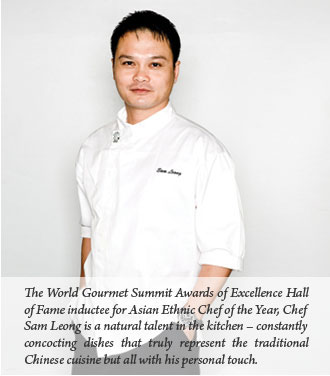Sam Leong
Stroll down any streets in Singapore and stop just about anyone, ask them if they know who Chef Leong is. Most definitely, you will get a positive answer. This just proves how famous and influential he is. Before setting his foot in Singapore, he had already worked in some of the best restaurants in Malaysia and Thailand, including a stint with his father (Malaysia’s King of Shark’s Fin) at their highly-acclaimed family restaurant. Bringing with him an insurmountable amount of skills and experiences, he became the corporate chef and director of kitchens of Tung Lok Restaurants (2000) Ltd – a name as synonymous to Asian cuisine in Singapore as he is. Perhaps, it is only apt.
Chef Leong’s illustrious culinary career started when he worked alongside his father. This was when he learnt all the essential skills and techniques. During the time under his father’s tutelage, he also developed a dedicated commitment in ensuring his work truly represents all that he stands for – exceptional quality and remarkable taste. Until today, the skills, techniques and commitment instilled in him is still very evident, what with the amount of accolades awarded to him. It appears that there is no stopping Chef Leong – everyday is a new day to him and he just keeps mesmerising us.
At the inaugural World Gourmet Summit Awards Of Excellence in 2001, Chef Leong was awarded the first ever Asian Ethnic Chef Of The Year award, winning it again twice more in 2002 and 2004. Not just famous in Singapore, he is also a force to be reckoned with in Asia. At this year’s World Gourmet Summit Awards Of Excellence, he became the first chef in the region to be awarded the Asian Cuisine Chef Of The Year (regional category). This amazing array of awards is just the tip of the iceberg – throughout his culinary career, he has amassed a whole list of other accolades, making it impossible for one to even think of going through this list in one breath.
Chef Leong is a shining example that if you put your heart to doing something, eventually success will be yours. Easy as it sounds, what is more important is the amount of dedication, diligence and perseverance invested in your case. We salute you, Chef Leong.
Interview with Sam Leong
What does being in the World Gourmet Summit (WGS) Hall Of Fame mean to you?
Being inducted in the WGS Hall Of Fame is a once in a lifetime achievement. I have been receiving many awards in my 28 years of being a chef, but I never thought that I could achieve something of this level, especially since I’m a Chinese chef. I’m proud of not only myself, but also the other Singaporean chefs who have done well and made us who we are today.
Who or what inspires you?
Up until this moment, I would say that there are two people who inspire me. The first person would be Peter A. Knipp. I’ve known Knipp since 1990, when I met him in Hilton Bangkok where he was an executive chef. My father-in-law was the butcher who worked alongside Knipp. He was invited to my wedding where I was officially introduced to him. I started reading up on the events that he used to take part in. My interactions with Knipp were limited to the couple of times that I travelled with him as guest chefs for Raffles Hotel Singapore. During those times, I observed the way he talked to people, the way he expects things to be done. This just goes to show that he is a natural leader. He is also a very decisive person, who gives a definite yes or no as answers.
He is also a very organised and detailed person. Back in those days when we didn’t have the luxury of PDAs, I’d see him jotting down notes in his organiser, coming up with agendas and plans for meetings. I see these traits as something I could possible take up. These days, when I do get to meet Knipp during the annual World Gourmet Summit, I’ll always take away with me one or two quotes from him which I find meaningful. To be able to work with him, you’d need to have the capability and experience to succeed. Also, the way he manages the staff meetings and role calls at the beginning of the day are traits that I follow at work because I am in charge of a small kitchen, which to me is like running a small company.
The next person would be my boss, Andrew Tjoe. He inspires me through his business and people relationships with others, and how he manages to set up so many restaurants. He has a quote that I’ll always remember: ‘As an upright business man who treats his business partners well and with a clear conscience, the worse you could do to me is to cheat my money’.
Do you have a quote that you live by?
To always forgive and forget, in all aspects of life. There’s no point in forgiving but not forgetting, because the next time an argument comes up, you would bring up the topic again, which in my opinion is pointless. I believe that to forgive and forget is a learning process. After attaining that concept, life will be made easier.
What advice would you give to the younger generation who would like to follow in your footsteps?
Being passionate and hardworking are just basic requirements. We see young people attending courses in culinary academies, saying that they have the passion and hardworking, and that they want to be like a certain chef. But once they graduate and start working as an apprentice chef, reality sets in. You pay to go to school to ask questions when you’re uncertain, you challenge your fellow peers in coming up with recipes. At work, you meet people and you’re paid to deliver. You must be committed to your work, to be loyal to your employer, and also to prepare to sacrifice.
I’m committed to my work because I’m in a good company and I have a good boss. Anyone could offer me twice of what I’m getting at Tung Lok, but yet, I’ll always say no, because I am committed to assisting in the launches of other Tung Lok restaurants. And once you are committed to your work, you will feel your sense of loyalty towards the company. And when your loyalty sets in, your company trusts you.
The last point is sacrifice of course, and when I say sacrifice, I mean getting a phone call from my boss during dinner time and having to rush back to the restaurant just to meet regular customers. There was this time when I was at the airport, about to go on a holiday with my wife when I received a phone call from Andrew Tjoe. My wife understood, saying that I should head back to the restaurant, and then take a later flight to join her. Then again, I’m not complaining because when you are committed and loyal to your company, little sacrifices comes along with the package. I believe that is how you gain faith and trust from your boss, like how Tjoe has a hundred percent faith in me.
What other cuisines would you like to master?
Ten years ago, I had the impression that I had already mastered the traditional Cantonese cuisine; but when Tung Lok extended to China, I was brought over to assist in the set-up, I was taken aback by the vast variety of Chinese food, and I realised that they was actually so much to learn, so many dishes that can be modified. Travelling then definitely inspired me to come up with contemporary Chinese Cuisine and it has become very popular.
Now, I would actually like to go back to the basics – home-cooked Chinese food. My third book A Taste of Home is all about home-cooked Chinese family fares. The idea of this third book came to me because I met up with some fans who told me that they liked my food, but when I asked them which restaurant they went to, they told me that they haven’t visited any of the restaurants, but they saw my television programmes and concluded that my cooking is good!
Throughout my career, I have always believed that once I have reached a certain level and achieved a certain goal, I should stop, take a breather, and look back on the things I have done.





